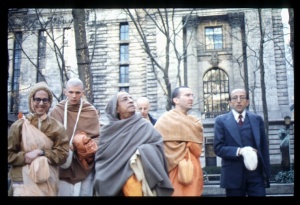CC Madhya 11.8 (1975)

A.C. Bhaktivedanta Swami Prabhupada
TEXT 8
- niṣkiñcanaṣya bhagavad-bhajanonmukhasya
- pāraṁ paraṁ jigamiṣor bhava-sāgarasya
- sandarśanaṁ viṣayiṇām atha yoṣitāṁ ca
- hā hanta hanta viṣa-bhakṣaṇato 'py asādhu
SYNONYMS
niṣkiñcanasya—of a person who has completely detached himself from material enjoyment; bhagavat—the Supreme Personality of Godhead; bhajana—in serving; unmukhasya—who is eager to be engaged; pāram—to the other side; param—distant; jigamiṣoḥ—who is desiring to go; bhava-sāgarasya—of the ocean of material existence; sandarśanam—the seeing (for some material purpose); viṣayiṇām—of persons engaged in material activities; atha—as well as; yoṣitām—of women; ca—also; hā—alas; hanta hanta—expression of great lamentation; viṣa-bhakṣaṇataḥ—than the act of drinking poison; api—even; asādhu—more abominable.
TRANSLATION
Greatly lamenting, the Lord then informed Sārvabhauma Bhaṭṭācārya, " 'Alas, for a person who is seriously desiring to cross the material ocean and engage in the transcendental loving service of the Lord without material motives, seeing a materialist engaged in sense gratification or seeing a woman who is similarly interested is more abominable than drinking poison willingly.' "
PURPORT
This is a quotation from Śrī Caitanya-candrodaya-nāṭaka (8.23). Thus Śrī Caitanya Mahāprabhu enunciates the principles for a sannyāsī renouncing the material world for spiritual advancement. Spiritual advancement is not meant for magic shows and jugglery but for crossing the material world and being transferred to the spiritual world. Pāraṁ paraṁ jigamiṣoḥ means desiring to go to the other side of the material world. There is a river called Vaitaraṇī, and on one side of this river is the material world, and on the other side is the spiritual world. Since the Vaitaraṇī River is compared to a great ocean, it is named bhava-sāgara, the ocean of repeated birth and death. Spiritual life aims at stopping this repetition of birth and death and entering into the spiritual world, where one can live eternally cognizant and blissful.
Unfortunately, the general populace does not know anything about spiritual life or the spiritual world. The spiritual world is mentioned in the Bhagavad-gītā (BG 8.20):
- paras tasmāt tu bhāvo 'nyo
- 'vyakto 'vyaktāt sanātanaḥ
- yaḥ sa sarveṣu bhūteṣu
- naśyatsu na vinaśyati
"Yet there is another unmanifest nature, which is eternal and is transcendental to this manifested and unmanifested matter. It is supreme and is never annihilated. When all in this world is annihilated, that part remains as it is."
Thus there is a spiritual nature beyond this material world, and that spiritual nature exists eternally. Spiritual advancement means stopping material activities and entering into spiritual activities. This is the process of bhakti-yoga. In the material world, the via media for sense gratification is mainly a woman. One who is seriously interested in spiritual life should strictly avoid women. A sannyāsī should never see a man or a woman for material benefit. In addition, talks with materialistic men and women are also dangerous, and they are compared to drinking poison. Śrī Caitanya Mahāprabhu was very strict on this point. He therefore refused to see King Pratāparudra, who was naturally always engaged in political and economic affairs. The Lord even refused to see the King despite the request of a personality like Sārvabhauma Bhaṭṭācārya, who was the Lord's intimate friend and devotee.